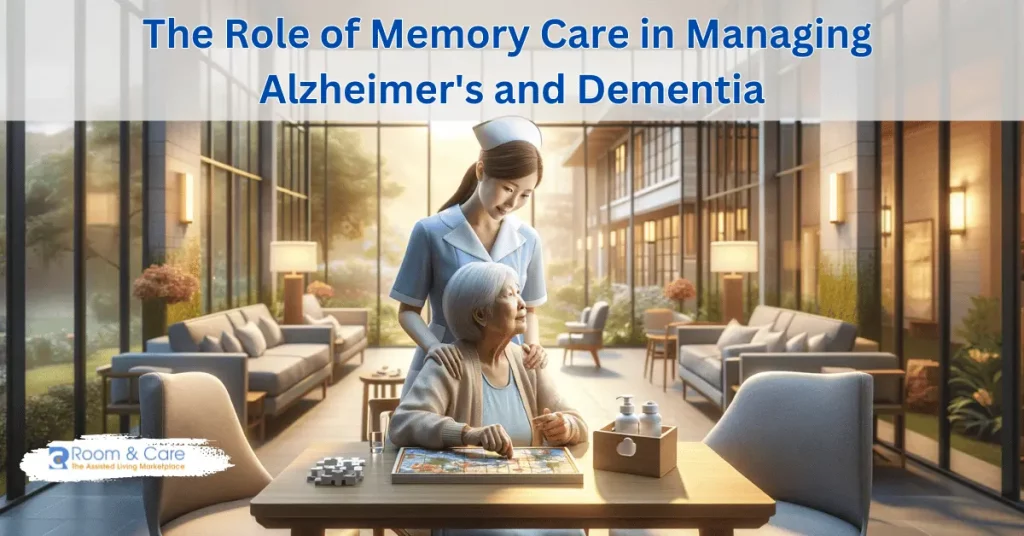

Alzheimer’s disease and dementia are increasingly impacting the senior population in the USA, presenting complex challenges for patients, families, and healthcare systems alike. As of my last update in April 2023, Alzheimer’s Disease International reported that nearly 50 million people worldwide are living with dementia, a number expected to triple by 2050. In the United States alone, the Alzheimer’s Association noted that over 6 million Americans are living with Alzheimer’s, making it the sixth leading cause of death.
These statistics not only highlight a healthcare challenge but also underscore the need for specialized approaches to care and support. Memory care, a focused branch of elder care, has emerged as a critical response to this need, combining personalized healthcare, supportive living environments, and therapeutic approaches specifically designed for individuals experiencing memory loss, cognitive impairment, and other symptoms associated with Alzheimer’s and dementia.

Alzheimer’s and dementia are often used interchangeably, but they are not synonymous. Alzheimer’s is a specific disease and the most common cause of dementia, accounting for 60-80% of cases. Dementia, on the other hand, is an umbrella term used to describe a range of symptoms associated with cognitive decline, such as memory loss, difficulty in thinking, problem-solving, and language.
The early signs of Alzheimer’s can be subtle – often mistaken as normal aging. These can include forgetfulness, mild confusion, and difficulty in performing familiar tasks. As the disease progresses, symptoms become more pronounced, leading to significant memory loss, disorientation, mood and behavior changes, and difficulty speaking, swallowing, and walking.
Memory care facilities have undergone significant evolution over the years. Initially, care for individuals with Alzheimer’s and dementia was integrated into traditional nursing homes or assisted living facilities. However, as understanding of these conditions deepened, the need for specialized care became apparent.
Modern memory care facilities are designed with the unique needs of dementia patients in mind, incorporating secure environments to prevent wandering and layouts that minimize confusion and agitation. Beyond medical treatment, they offer structured activities tailored to individual abilities and interests, helping maintain cognitive functions and social connections as long as possible.
One of the cornerstones of exceptional memory care is a team of specialized staff. These professionals are not just trained in general elder care but have specific expertise in managing Alzheimer’s and dementia-related challenges. As per the Alzheimer’s Association guidelines, ongoing training in behavioral management and communication strategies is crucial. This ensures that the staff can provide compassionate, effective care while also addressing the unique psychological needs of residents.
The physical environment of a memory care facility plays a critical role in the well-being of its residents. Design elements like simple, clear layouts, secure outdoor spaces, and non-stimulating color schemes help reduce confusion and agitation in residents. Safety features are also paramount. According to a 2023 study, facilities with advanced safety features, like secured exits and surveillance, significantly reduce the risk of wandering, a common and potentially dangerous issue among dementia patients.
Personalized care is at the heart of effective memory care. This involves developing individualized care plans that consider each resident’s medical history, preferences, and abilities. A study by the National Institute on Aging emphasized the importance of tailored activities and therapies in enhancing the quality of life for dementia patients, as it helps maintain their sense of identity and autonomy.

Innovative therapies in memory care often focus on cognitive stimulation. Techniques like reminiscence therapy, brain games, and art therapy not only provide enjoyment but also help slow cognitive decline. A 2023 research review highlighted that activities stimulating memory and thinking skills can lead to significant improvements in cognitive function.
Physical and social activities are equally vital in memory care settings. Structured programs including light exercise, dance, and group activities encourage physical health and foster a sense of community among residents. The Alzheimer’s Society has reported that regular physical activity can help reduce the risk of cognitive decline and improve overall well-being.
Effective communication between memory care staff and families is essential. Regular updates on the resident’s health and involvement in care planning can create a transparent, trusting environment. As per the Family Caregiver Alliance, open communication helps families understand the disease progression and care approaches, alleviating anxiety and uncertainty.
The emotional impact on families cannot be overstated. Memory care facilities often offer support groups, counseling, and educational sessions to help families cope with the emotional challenges of a loved one’s dementia journey. These resources are critical, as indicated by a 2023 survey, where caregivers expressed that emotional support significantly reduced their stress and improved their capacity to provide care.
Memory care facilities, tailored for individuals with dementia and Alzheimer’s, offer a range of specialized services that set them apart from traditional senior living options. As of 2023, these facilities typically have a staff-to-resident ratio of around 1:4 to 1:8, significantly higher than traditional senior living homes, which often have ratios closer to 1:15 or 1:20. This higher staffing level allows for more personalized care and attention to each resident’s needs. Security features in memory care facilities are also more robust, with advanced systems to prevent wandering – a concern for approximately 60% of dementia patients at some point during their illness.
When considering memory care versus traditional senior living, families often weigh factors such as the severity of cognitive impairment and the need for specialized care. Memory care facilities are generally better equipped to handle advanced stages of dementia, offering programs specifically designed to slow cognitive decline and enhance quality of life. For instance, these programs might include structured activities like music therapy, which has been shown to improve cognitive function in up to 50% of participants with dementia.
The demand for qualified dementia care professionals far exceeds the supply. This staffing challenge is exacerbated by a high turnover rate, which in some regions can be as high as 60-70% annually. To combat this, many facilities are now offering enhanced training programs and competitive compensation packages, including benefits and opportunities for career advancement.
The cost disparity between memory care and traditional senior living is notable. On average, memory care can be approximately 25-30% more expensive than standard assisted living. In 2023, the monthly cost for memory care in the U.S. averaged between $4,000 to $7,000, depending on the region and level of care required, compared to $3,000 to $5,000 for traditional assisted living.
Technological advancements are poised to revolutionize memory care. AI-driven monitoring systems are being increasingly adopted, with the market for such technologies expected to grow by 25-30% in the next five years. Virtual reality therapy, another emerging trend, has shown potential in improving cognitive function and reducing agitation in dementia patients.
Research into Alzheimer’s and dementia is making significant strides. Recent studies have identified potential biomarkers for early Alzheimer’s detection, offering a possibility of diagnosis before major symptoms appear. Additionally, clinical trials for new dementia medications are underway, with some showing promise in slowing disease progression, potentially benefiting millions worldwide in the coming years.
Memory care facilities in the United States must adhere to a range of federal and state regulations. For example, the staff-to-resident ratio, as mandated by various state laws, can range from 1:5 to 1:15, depending on the level of care required and the state. The Health Insurance Portability and Accountability Act (HIPAA) enforces strict guidelines on patient privacy, with facilities potentially facing fines ranging from $100 to $50,000 per violation for non-compliance.
Ethical considerations in memory care focus on balancing safety and autonomy. The National Center for Ethics in Health Care emphasizes the importance of informed consent, which can be challenging when a resident’s decision-making ability is impaired. Memory care facilities are encouraged to involve residents in care decisions as much as their cognitive state allows, adhering to the principles of respect and dignity. Facilities that fail to meet these ethical standards can face legal repercussions, including lawsuits and loss of licensure.
The cost of memory care varies widely across the United States. As of 2023, the average monthly cost ranges from $4,500 to $9,000, influenced by factors like location, facility amenities, and the specific needs of the resident. This represents a significant increase from traditional senior living, which averages between $3,000 and $6,000 per month.
Medicare typically does not cover long-term memory care costs, but Medicaid can provide coverage for eligible individuals, particularly in facilities that accept Medicaid payments. Long-term care insurance policies also vary widely in coverage, with some policies covering up to $250 per day or more for memory care services. Families often explore additional options like veterans’ benefits, which can provide up to $2,266 per month for a veteran needing memory care.

Community involvement in supporting memory care is growing. Volunteer engagement in memory care settings can range from individual visits to organized group activities. Public awareness campaigns have also been effective, with initiatives like the Alzheimer’s Association’s “Walk to End Alzheimer’s” raising over $77 million in 2022 alone.
Advocacy is vital in enhancing memory care support. Efforts at the local and national levels focus on securing funding for Alzheimer’s research, which in the United States, reached approximately $3.1 billion in federal funding in 2023. These advocacy efforts aim to improve care standards and influence public policy to better support individuals with memory impairments.
As we look towards the future in the management of Alzheimer’s and dementia, the field of memory care is evolving rapidly with promising innovations and a deeper understanding of compassionate care. The integration of advanced technologies and holistic treatment approaches promises to enhance the quality of life for individuals affected by these conditions. This evolution in care practices emphasizes not just medical advancements but also the creation of a supportive environment for both patients and their families.
In navigating this evolving landscape, choosing the right memory care facility becomes a pivotal decision for families. Platforms like Room & Care are revolutionizing this process, simplifying the search for appropriate care homes. By offering direct booking options, Room & Care helps families avoid costly referral fees, making it a cost-effective choice without compromising the quality of care. This approach empowers families to make informed decisions, ensuring that their loved ones’ unique needs and preferences are met. As advancements continue, tools like Room & Care are invaluable in guiding families through the complexities of memory care with understanding, precision, and compassion.